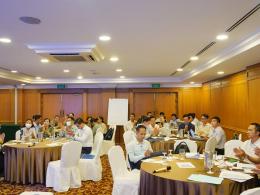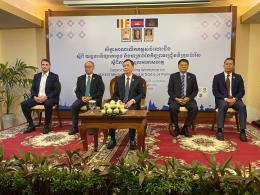The Ministry of Environment (MoE) and the National Council for Sustainable Development (NCSD) have the honor to inform the public, national and international media, NGOs, relevant ministries/ institutions, and all stakeholders that the MoE and UNDP organized the inception workshop of the Cambodia’s Nationally Determined Contribution 3.0 (NDC3.0) on 27 January 2025.
The event was chaired by H.E. Choup Paris, Secretary of State of the Ministry of Environment and Chair of the Climate Change Technical Working Group (CC-TWG) and H.E. Jo Scheuer, UN Resident Coordinator. It was participated by delegations from the Ministry of Environment, the Climate Change Working Group (CCTWG), representatives from relevant ministries and institutions, development partners, civil society organizations, indigenous groups, youth representatives, and academia, totaling 200 participants.
The official launching of the process for developing this key climate change policy marks a milestone in Cambodia’s effort to fight against climate change and confirms Cambodia’s strong commitments to Paris Agreement’s goals.
The year 2025 marks the 10th anniversary of the Paris Agreement and is a critical moment in the collective fight against climate change. Countries are expected to submit the third generation of Nationally Determined Contributions (NDCs) that represent the commitments by each country to reduce emissions and adapt to the impacts of climate change. This is the last chance for the international community to correct the course for maintaining global warming under 1.5 degrees centigrade.
The Royal Government of Cambodia is committed to preparing a more ambitious, implementable and inclusive NDC3.0 and will count on the support of UN agencies and development partners, coordinated by UNDP that has leveraged its Climate Promise infrastructure. Guided by the need for raising ambition, accelerating implementation, and ensuring inclusiveness to leave no one behind, this joint effort will also contribute to the acceleration of the Sustainable Development Goals, and it will be aligned with national priorities.
In the opening session, H.E. Chuop Paris affirmed that Cambodia is highly vulnerable to the impacts of climate change, which include rising temperatures, frequent extreme weather events, and rising sea levels and these factors threaten the country’s agriculture, fisheries, and tourism industries. However, Cambodia has demonstrated the capacity to address these impacts by establishing an ambitious climate agenda and key policies. These include the Updated Nationally Determined Contribution in 2020, the Long-term Strategy for Carbon Neutrality in 2021, and the integration of climate change into national sectoral policies and processes. The Ministry of Environment, on behalf of the Royal Government of Cambodia, will develop Cambodia’s Nationally Determined Contribution (NDC 3.0) showcasing the country’s ambitious targets to reduce greenhouse gas emissions across all sectors such as energy, industry (IPPU), agriculture, forestry and land use, and waste.
Mr. Jo Scheuer, UN Resident Coordinator, emphasized that Cambodia NDC3.0's development presents a crucial opportunity for the country at a time when taking action against climate change is imperative. As the world approaches critical climate tipping points, this policy stands out as one of the most significant initiatives for Cambodia this year. It’s also an opportunity for establishing a truly inclusive decision-making process through the empowerment of youth, IPs, local communities and marginalised groups is a challenge and an opportunity in the decision-making process that the Ministry of Environment is at the forefront of. The aim and opportunity are to strengthen a whole-of-society approach through sustained engagement, effective leadership, promotion of gender equality and a human rights-based framework.
Ms. Alissar Chaker, UNDP Resident Representative in Cambodia, emphasized that Cambodia’s NDC3.0 is a chance to define and update national development pathways using national climate plans also as investment plans that would unlock capital and chart a just and equitable transition to green and net-zero growth, eventually. UNDP, as the United Nations (UN) technical lead, is committed to leveraging expertise, resources, and partnerships to support the Royal Government along with other UN sister agencies and development partners in updating its climate commitments ensuring their alignment with national development ambitions and priorities and the sustainable development agenda leaving no one behind.
In the coming months, technical teams led by the Royal Government with support from UNDP and other UN agencies, development partners, and NGOs will work on designing ambitious yet realistic targets and measures. A series of consultations will be organized at the national and sub-national levels culminating in a national validation workshop prior to submission to the United Nations Framework Convention on Climate Change by July 2025.



